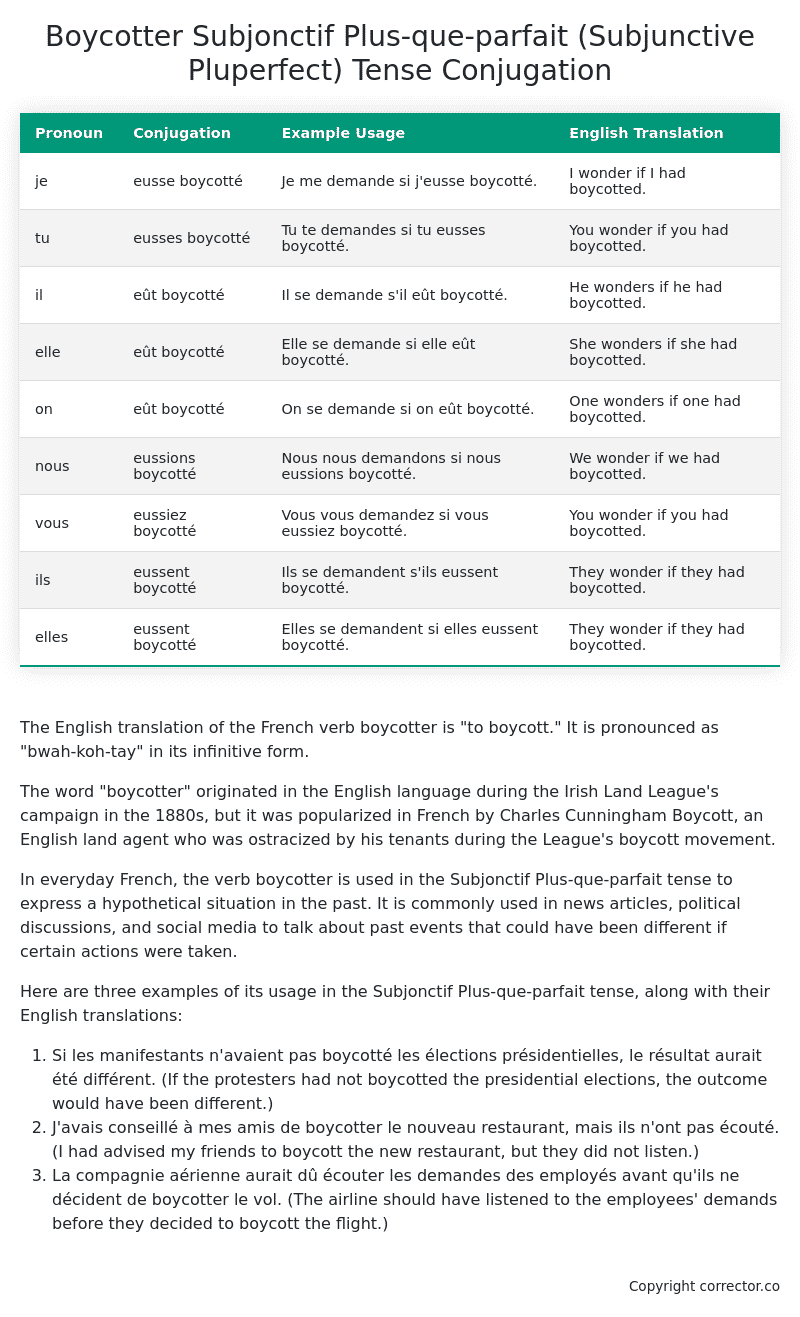Subjonctif Plus-que-parfait (Subjunctive Pluperfect) Tense Conjugation of the French Verb boycotter
Introduction to the verb boycotter
The English translation of the French verb boycotter is “to boycott.” It is pronounced as “bwah-koh-tay” in its infinitive form.
The word “boycotter” originated in the English language during the Irish Land League’s campaign in the 1880s, but it was popularized in French by Charles Cunningham Boycott, an English land agent who was ostracized by his tenants during the League’s boycott movement.
In everyday French, the verb boycotter is used in the Subjonctif Plus-que-parfait tense to express a hypothetical situation in the past. It is commonly used in news articles, political discussions, and social media to talk about past events that could have been different if certain actions were taken.
Here are three examples of its usage in the Subjonctif Plus-que-parfait tense, along with their English translations:
- Si les manifestants n’avaient pas boycotté les élections présidentielles, le résultat aurait été différent. (If the protesters had not boycotted the presidential elections, the outcome would have been different.)
- J’avais conseillé à mes amis de boycotter le nouveau restaurant, mais ils n’ont pas écouté. (I had advised my friends to boycott the new restaurant, but they did not listen.)
- La compagnie aérienne aurait dû écouter les demandes des employés avant qu’ils ne décident de boycotter le vol. (The airline should have listened to the employees’ demands before they decided to boycott the flight.)
Table of the Subjonctif Plus-que-parfait (Subjunctive Pluperfect) Tense Conjugation of boycotter
| Pronoun | Conjugation | Example Usage | English Translation |
|---|---|---|---|
| je | eusse boycotté | Je me demande si j’eusse boycotté. | I wonder if I had boycotted. |
| tu | eusses boycotté | Tu te demandes si tu eusses boycotté. | You wonder if you had boycotted. |
| il | eût boycotté | Il se demande s’il eût boycotté. | He wonders if he had boycotted. |
| elle | eût boycotté | Elle se demande si elle eût boycotté. | She wonders if she had boycotted. |
| on | eût boycotté | On se demande si on eût boycotté. | One wonders if one had boycotted. |
| nous | eussions boycotté | Nous nous demandons si nous eussions boycotté. | We wonder if we had boycotted. |
| vous | eussiez boycotté | Vous vous demandez si vous eussiez boycotté. | You wonder if you had boycotted. |
| ils | eussent boycotté | Ils se demandent s’ils eussent boycotté. | They wonder if they had boycotted. |
| elles | eussent boycotté | Elles se demandent si elles eussent boycotté. | They wonder if they had boycotted. |
Other Conjugations for Boycotter.
Le Present (Present Tense) Conjugation of the French Verb boycotter
Imparfait (Imperfect) Tense Conjugation of the French Verb boycotter
Passé Simple (Simple Past) Tense Conjugation of the French Verb boycotter
Passé Composé (Present Perfect) Tense Conjugation of the French Verb boycotter
Futur Simple (Simple Future) Tense Conjugation of the French Verb boycotter
Futur Proche (Near Future) Tense Conjugation of the French Verb boycotter
Plus-que-parfait (Pluperfect) Tense Conjugation of the French Verb boycotter
Passé Antérieur (Past Anterior) Tense Conjugation of the French Verb boycotter
Futur Antérieur (Future Anterior) Tense Conjugation of the French Verb boycotter
Subjonctif Présent (Subjunctive Present) Tense Conjugation of the French Verb boycotter
Subjonctif Passé (Subjunctive Past) Tense Conjugation of the French Verb boycotter
Subjonctif Imparfait (Subjunctive Imperfect) Tense Conjugation of the French Verb boycotter
Subjonctif Plus-que-parfait (Subjunctive Pluperfect) Tense Conjugation of the French Verb boycotter
Conditionnel Présent (Conditional Present) Tense Conjugation of the French Verb boycotter
Conditionnel Passé (Conditional Past) Tense Conjugation of the French Verb boycotter
L’impératif Présent (Imperative Present) Tense Conjugation of the French Verb boycotter
L’infinitif Présent (Infinitive Present) Tense Conjugation of the French Verb boycotter
(this article)
Struggling with French verbs or the language in general? Why not use our free French Grammar Checker – no registration required!
Get a FREE Download Study Sheet of this Conjugation 🔥
Simply right click the image below, click “save image” and get your free reference for the boycotter Subjonctif Plus-que-parfait tense conjugation!

Boycotter – About the French Subjonctif Plus-que-parfait (Subjunctive Pluperfect) Tense
Formation
Common Everyday Usage Patterns
Hypothetical Situations
Reported Speech
Doubt, Wishes, and Emotions
Interactions with Other Tenses
Present Subjunctive
Imperfect Subjunctive
Conditional
Summary
I hope you enjoyed this article on the verb boycotter. Still in a learning mood? Check out another TOTALLY random French verb conjugation!


